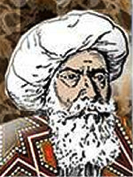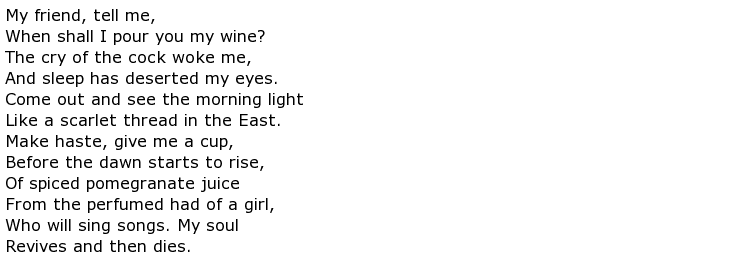 The Hebrew medieval poet known as Samuel ha-Nagid was an extremely influential man who lived in the part of southern Spain, which is now known as Andalusia, that was occupied by the Moors in the 11th century. Apart from being a well-known writer he was a philologist, politician and soldier who acted as patron to other poets and artists. History records him as being possibly THE most politically influential Jew living in Muslim-ruled Spain at the time.
The Hebrew medieval poet known as Samuel ha-Nagid was an extremely influential man who lived in the part of southern Spain, which is now known as Andalusia, that was occupied by the Moors in the 11th century. Apart from being a well-known writer he was a philologist, politician and soldier who acted as patron to other poets and artists. History records him as being possibly THE most politically influential Jew living in Muslim-ruled Spain at the time.
He was born Samuel ibn Naghrillah sometime during the year 993 in Mérida. Although he would eventually study Jewish law and become a Talmudic scholar, equally adept at speaking Arabic and Hebrew, his beginnings were relatively humble. He ran a shop in Cordoba until the Berbers overran the city during the civil war which began in 1009. He migrated along the southern coast towards Malaga, again setting up a shop, this time selling spices. He, almost accidentally, got involved with the royal court at Granada when one of the vizier’s servants asked Naghrillah to write some letters for her, and thus he came to the vizier’s attention. This led to secretarial appointments and the post of tax collector. Eventually the Berber king Habus al-Muzaffer appointed him assistant vizier of state.
He made a shrewd political move in 1038 when, on the death of the king, he championed the second son Badis as successor. For his help, Badis made Naghrillah a general in his army and his vizier. His escalation in public and military life was astonishing, considering that he was a Jew in a Muslim world. He succeeded though and he eventually took the title nagid, which means prince, thus changing his name to Samuel ha-Nagid. No other Jew reached the same heights in Muslim Spain at that time.
Naturally he was keen to promote Jewish culture, encouraging other writers to follow his lead in producing work inspired by the Holy Scriptures, the Mishnah and the Talmud. A period of calm and prosperity followed until, on the 31st December 1066, the Muslim population of Granada turned on the Jewish inhabitants, massacring them. Nagid’s own son, who had succeeded his father as vizier, was crucified by a mob on the city’s main gate. Although the devastated community recovered for a while they were destroyed once more by the Almoravids in 1090.
Nagid succeeded as a popular poet by merging the Arabic style of poetry with traditional Hebrew methods. This new, and somewhat unorthodox, form of writing seemed to work and was accepted by Muslim and Jew alike. He even wrote while in battle and, following a great victory over the Berbers and their allies at Ronda in September 1047 he wrote, in Hebrew, expressing his gratitude that he had been delivered from the jaws of death. He described it as:

Here is an example of one of his poems, called An Invitation:

A major achievement outside of poetry and his political life was to found a seat of learning known as the Yeshiva. It was a successful venture and many brilliant scholars graduated from it, including the likes of R’ Yitzhaq ibn Ghiath and R’ Maimon ben Yosef. His own poetic output included Ben Mishlei” (Son of Proverbs), Ben Qoheleth (Son of Ecclesiastes) and Ben Tehillim (Son of Psalms).
Samuel ha-Nagid died of natural causes, sometime during the year 1056. It is believed that he was 63 years old.

